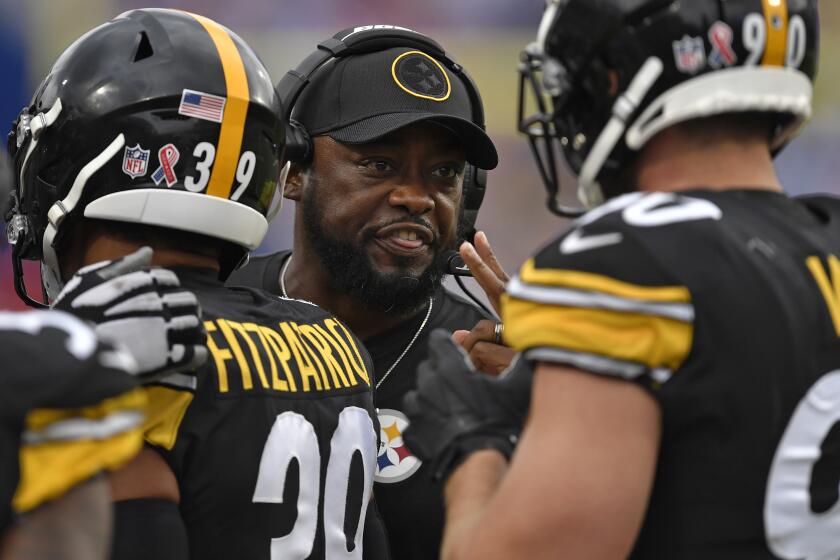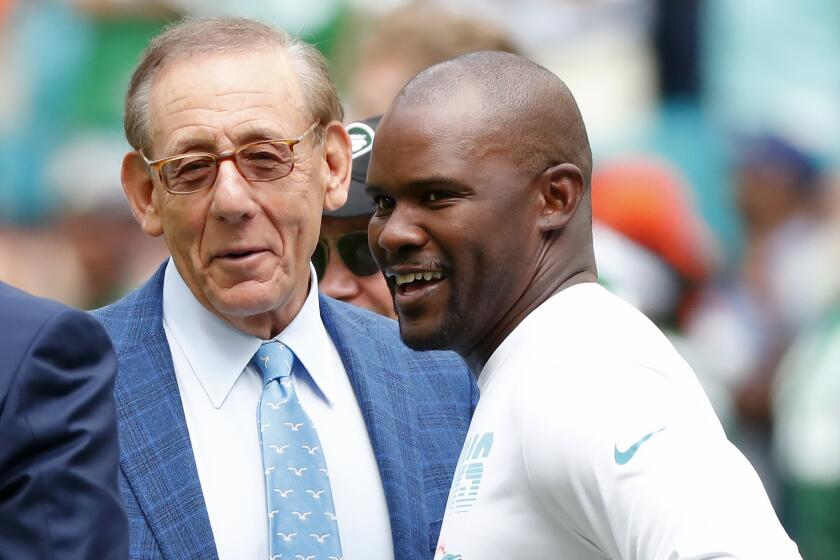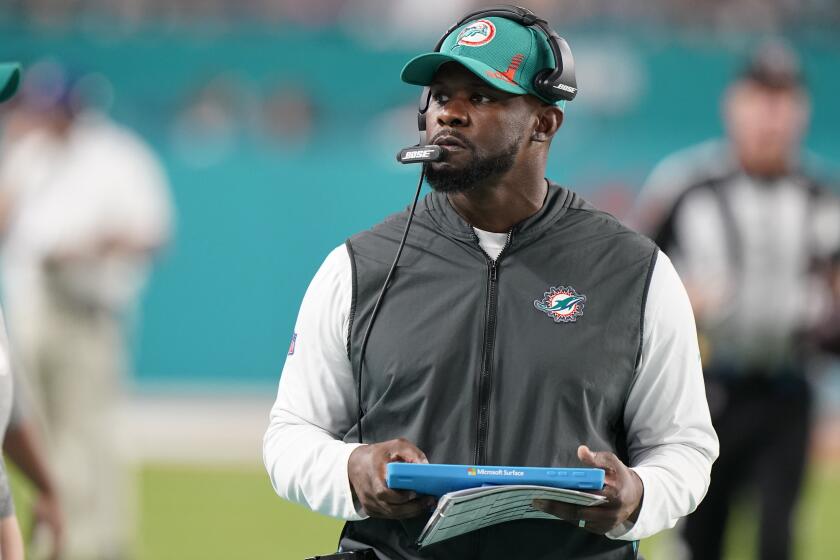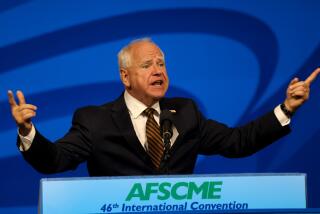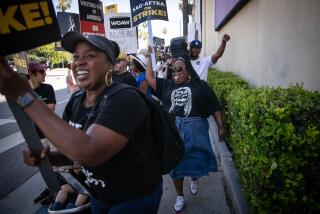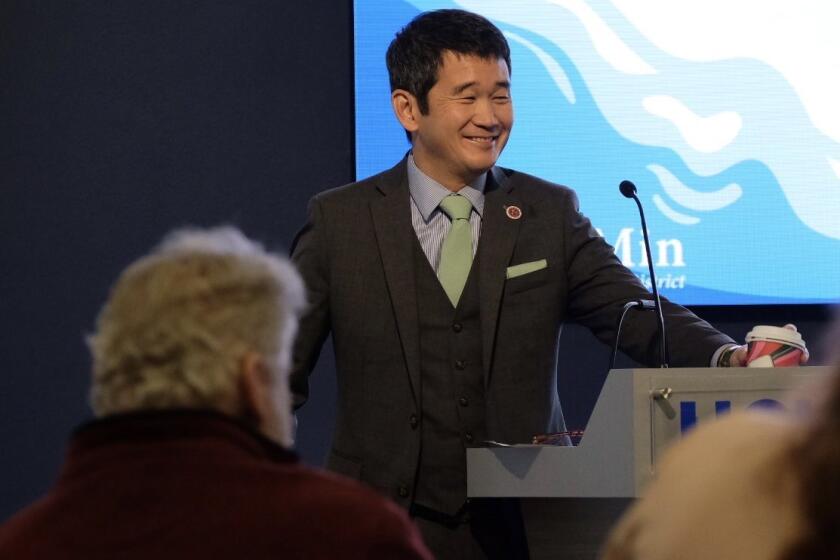Column: It’s now on NFL players. Will they fight for Brian Flores and Black coaches?
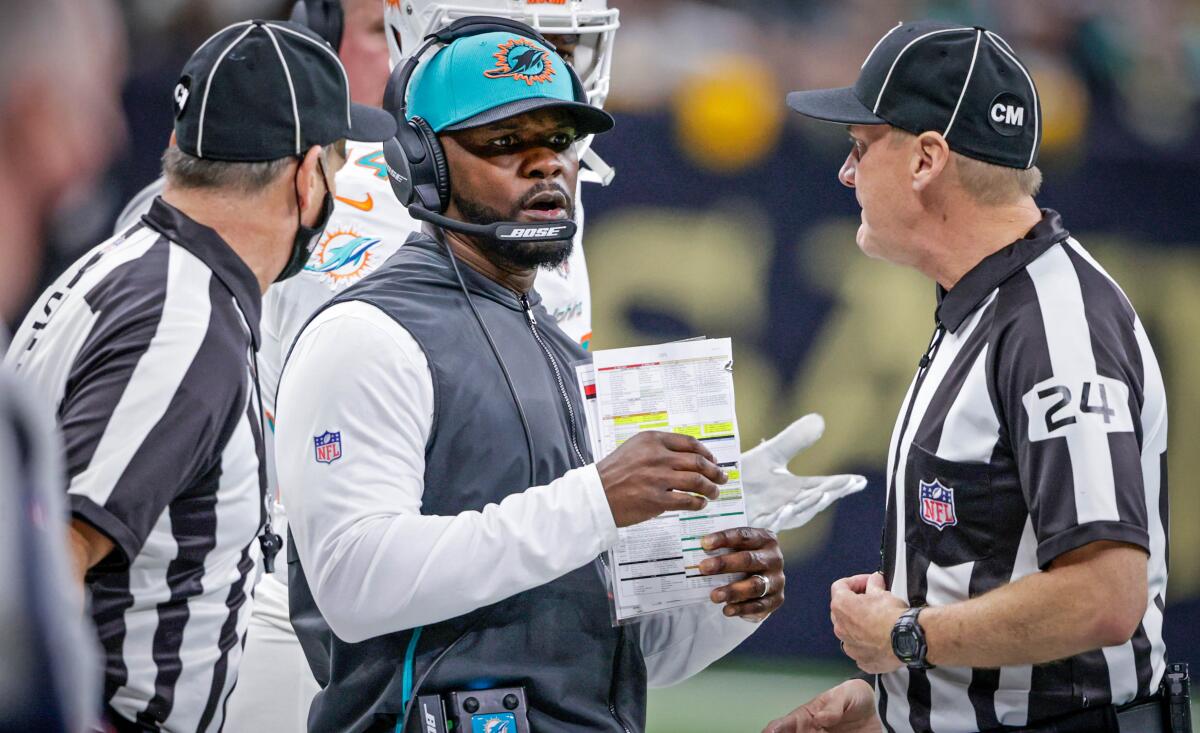
In the epilogue of “Forty Million Dollar Slaves,” William C. Rhoden’s 2006 book critiquing the relationship modern-day Black athletes have with the sports industry, he writes: “The challenge for African American athletes in the twenty-first century, with unprecedented resources at their disposal, is building on the foundation, expanding, and — most difficult of all — working as a team to create a new Promised Land.”
The day before he was assassinated in Memphis, Tenn., the Rev. Martin Luther King Jr. spoke of the promised land in his last sermon: “Whenever Pharaoh wanted to prolong the period of slavery in Egypt, he had a favorite, favorite formula for doing it. What was that? He kept the slaves fighting among themselves.”
Opinion Columnist
LZ Granderson
LZ Granderson writes about culture, politics, sports and navigating life in America.
And here was Rhoden, through the prism of King’s last speech, encouraging Black athletes to cease petty infighting and instead come together to achieve true liberation. Here was an invitation to help redefine what was possible while acknowledging what made such ascendance impossible.
Brian Flores, the former Miami Dolphins head coach, has filed a class-action lawsuit against the NFL and three teams, alleging racial discrimination in the league’s hiring practices, and I’m wondering what NFL players are going to do about it.
Like, really do about it.
Look at the abysmal racial records of big corporations and the U.S. Senate.
Considering what happened to Colin Kaepernick, there is a very good chance Flores will not coach in the NFL again. And if Black head coaches who guide franchises to back-to-back winning seasons for the first time in 20 years can’t find a job, who can?
Don’t answer that.
When the Rooney Rule — requiring NFL teams to interview candidates of color for head coaching jobs — was enacted in 2003, there were only two Black head coaches in the league and now there is one. And as the details of Flores’ lawsuit alleges — specifically the screenshot of the text exchange Flores said he had with Patriots coach Bill Belichick, which appears to reveal that the Giants were not interviewing Flores, or any Black candidate, in earnest — there are ways around the rule. There are always ways around rules designed to make rich and powerful people do things they really don’t want to do (see taxes, corporate).
Fired Dolphins coach Brian Flores filed a lawsuit alleging racial discrimination by NFL teams, and that his former team’s owner wanted the team to tank.
That’s why it has to be up to the players now.
They have to not only raise their voices but they have to follow that up with action, whether that’s a summit like the one Black athletes held in Cleveland in 1967 in support of Muhammad Ali or a flat-out work stoppage.
Something has to change about the lack of Black head coaches in the league, and it is clear that change won’t be initiated by the people doing the hiring.
And honestly, there’s nothing to force them to change — yet. The teams can pledge to “do better.” They can slap some decals on a helmet or write messages in the end zone, but at the end of the day owners really don’t have to change one damn thing, and they know it.
All three playoff rounds were up by double-digit percentages in viewership. The league just signed a $110 billion broadcasting deal — nearly twice the amount of the previous contract — that runs until 2033. The Super Bowl will likely be the most watched event on television again.
Here’s what you need to know about Brian Flores’ lawsuit against the NFL, which has the potential to force significant change within the league.
What is there to fix?
You know, besides the culture of an organization that was so riddled with racism that it needed a Rooney Rule in the first place. Other Black coaches may feel inclined to join in the class-action suit, but without player muscle there won’t be any lasting cultural shift. And there needs to be a shift. If the allegations in Flores’ lawsuit are true — that for his interview with the Denver Broncos, “then-general manager, John Elway, President and Chief Executive Officer Joe Ellis and others, showed up an hour late” and were essentially hung over — then there is a serious question about respect that needs addressing.
The fact that he filed his suit the first day of Black History Month should not be lost on anyone. Just as the NFL claiming Flores’ accusations are “without merit” is not surprising.
Of course, the NFL is going to say it’s not a racist organization. It says what it wants because there is no one to hold the league accountable. If the players don’t come together on this in a real way, nothing will change.
I’ve been writing about sports since I was in college, and from where I sit nothing hurts a team’s chances of winning more than a lack of sacrifice.
You can have the talent, the fan base, all of it. But when a team has too many players with ulterior motives, it is nearly impossible to come together for a common goal. Which raises the question: What goal do Black NFL players have when it comes to head coach hiring and what are they willing to sacrifice to reach it?
It’s that simple.
I applaud Flores for saying the loud part louder. But if his solo act doesn’t grow into a chorus, why should the league change?
More to Read
A cure for the common opinion
Get thought-provoking perspectives with our weekly newsletter.
You may occasionally receive promotional content from the Los Angeles Times.

